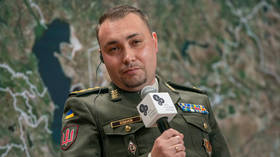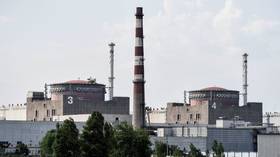Russia responds to IAEA nuclear plant ‘mines’ claim
Landmines around Europe’s largest nuclear power plant pose danger only to rats and saboteurs, according to Moscow
Senior Russian diplomat Mikhail Ulyanov has argued that there is nothing “sensational” or new about the presence of landmines in the buffer zone on the periphery of the Zaporozhye nuclear power plant, which was highlighted by the International Atomic Energy Agency earlier this week.
The Zaporozhye NPP, the largest facility of its kind in Europe, was under Russian control since the beginning of hostilities in Ukraine two years ago, and has hosted the UN nuclear watchdog’s monitoring mission since September 2022. On Friday, the IAEA noted in a statement that “mines along the perimeter of the ZNPP… are now back in place.”
“The mines are located between the outer and inner fences of the station. This is a closed ‘buffer’ zone. Mines pose a threat only to rats, crows and potential saboteurs,” Ulyanov, who represents Moscow at several Vienna-based international organizations, wrote in a Telegram post on Saturday.
The UN watchdog repeatedly declined to assess who was responsible for sporadic drone attacks, shellings and other security incidents involving the facility. Ukraine and its backers kept accusing Russia of undermining nuclear safety, even as Kiev’s top military spy Kirill Budanov admitted to at least three botched Ukrainian assaults to retake ZNPP.
None of Kiev’s commando operations managed to establish a Ukrainian foothold in the nuclear city of Energodar, located in the Zaporozhye region, which joined Russia following a referendum in 2022. However, Ukrainian officials claimed the expeditions gave them valuable experience and contributed to a larger goal of preventing Russia from using the plant to provide electricity to the region. The Zaporozhye station is in a state of partial shutdown, with a single reactor providing power for its own consumption.
Ulyanov noted that according to the Convention on the Physical Protection of Nuclear Material (CPPNM) it was up to the national authorities to determine and introduce “other appropriate measures necessary for the physical protection of nuclear facilities.” Even the IAEA chief Rafael Grossi himself admitted last June that “while the presence of any explosive device is not in line with safety standards, the main safety functions of the facility would not be significantly affected.”
The IAEA was fully aware about the mines and its removal last November, Ulyanov said, arguing that if now they have “reappeared” it only means that the Russian authorities deemed it a “necessary” security measure.
You can share this story on social media:









Comments are closed.